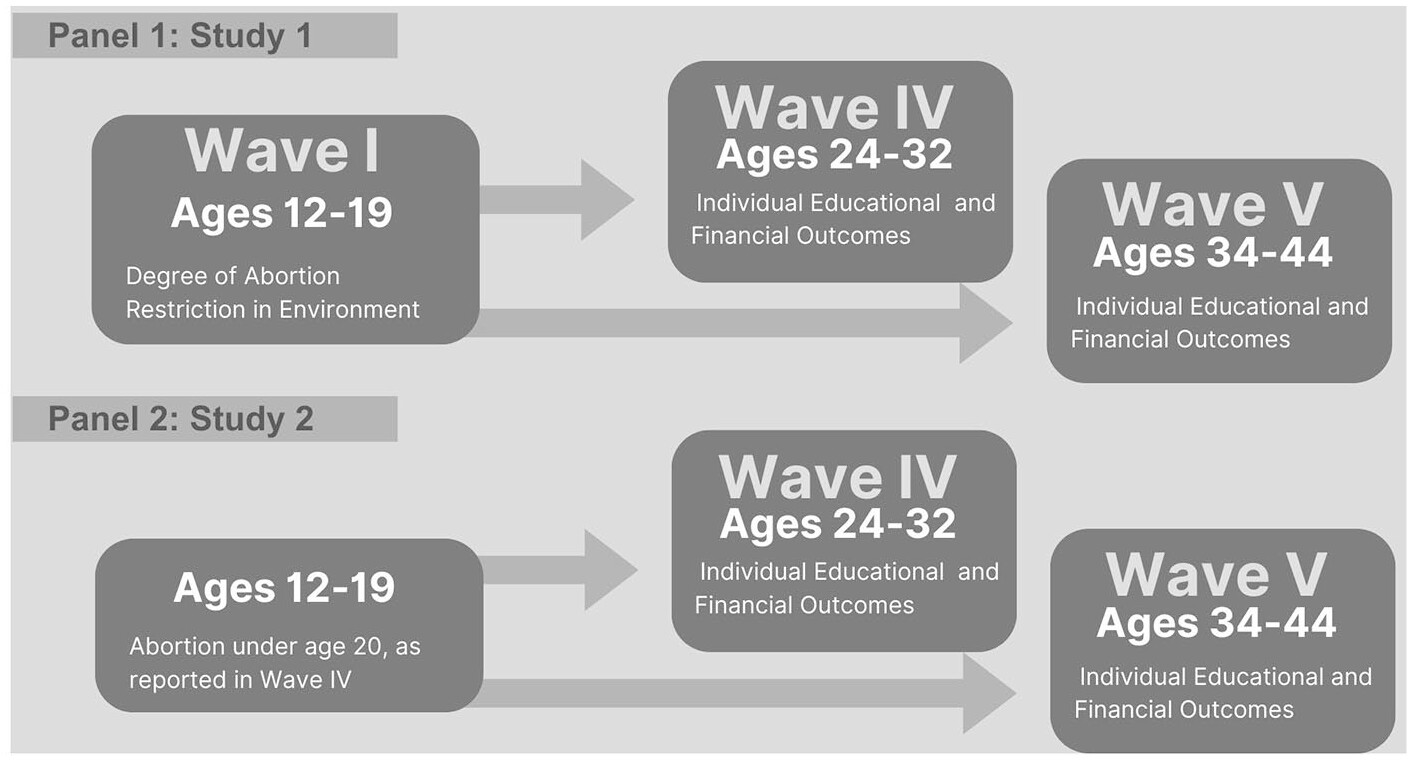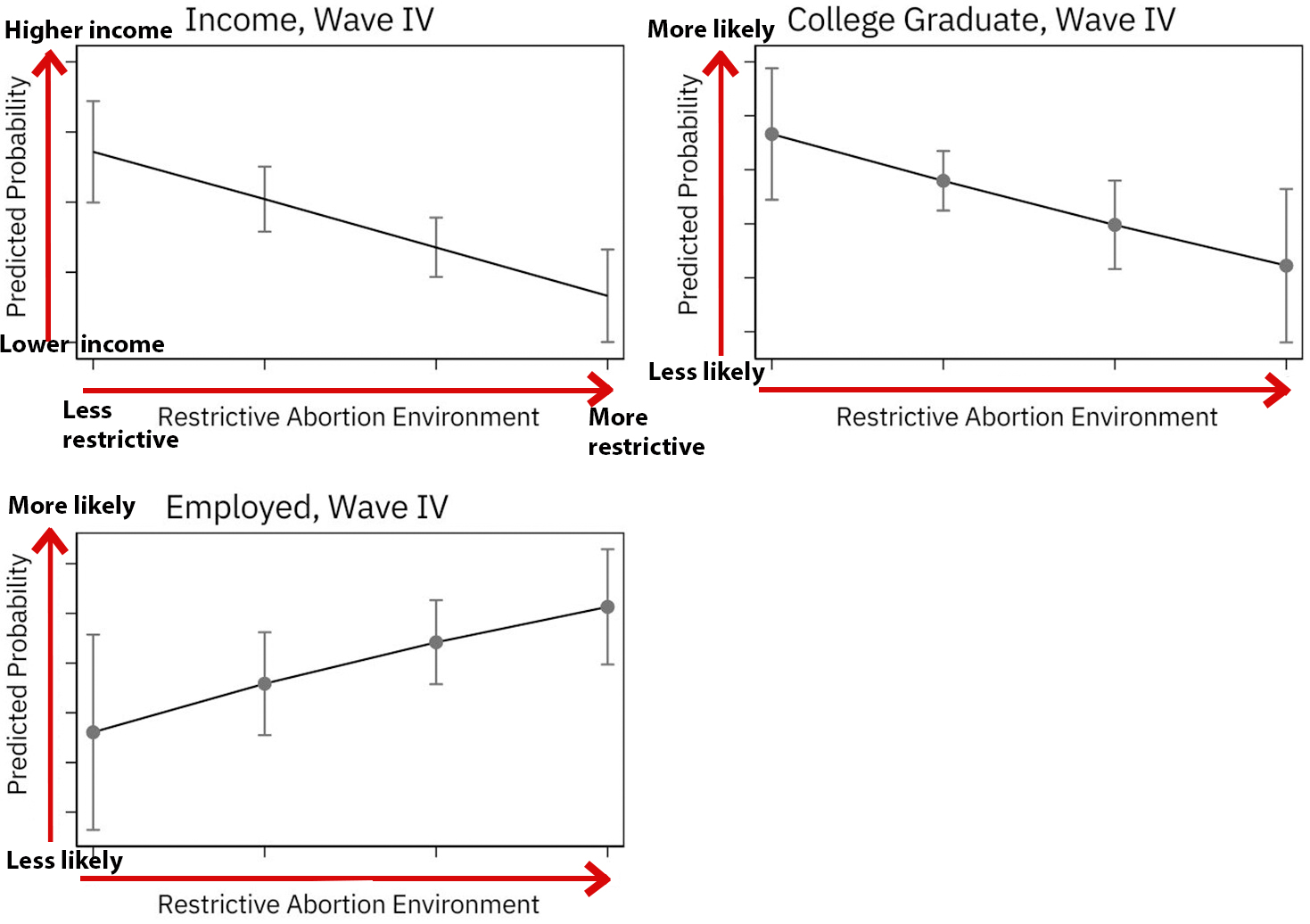Abortion and women’s future socioeconomic attainment
Access to safe, legal abortion can be a lifelong economic stratifier, according to a new analysis of a national database of adolescent health information.
The new study assesses abortion and socioeconomic outcomes in two ways, both using data from the National Longitudinal Study of Adolescent to Adult Health (Add Health). First, the authors analyzed the relationship between living one’s teenage years in a region with abortion restrictions and socioeconomic status in adulthood. Second, they compared adult outcomes between adolescent girls who became teen moms and those girls who avoided teen parenthood because they had an abortion.
The authors found that adolescent women in regions with fewer abortion restrictions and those who reported having an abortion were more likely to have graduated from college, earn higher incomes and have greater financial stability at two time-points over an almost 25-year period. Girls who became teen moms, conversely, were more likely to experience eviction, debt and food insecurity.
One in 4 women will have had an abortion before the end of her reproductive years, more than half of whom are already mothers. Surveys show that the main reason women say they have an abortion is because they can’t afford to raise a child or raise more children. As abortion access and policy shift wildly in the United States, it’s crucial to understand how abortion access impacts women’s socioeconomic futures.
“Childbearing is one of the most consequential decisions women will make in their lives, and their partner and family’s lives,” said Bethany Everett, sociologist at the University of Utah and lead author of the study. “If we’re going to pass policies that ban or restrict abortion, we should understand how they will impact women’s lives and society more broadly.”
The study was published in the American Sociological Review on Nov. 11, 2024.
Abortion: a mechanism for economic stratification

Caption: Study design
Credit: Everett & Taylor (Am Soc Rev) 2024
The study is the first to link abortion policy at the macro-level to outcomes at the individual-level. Using Add Health data, the authors assessed state- and county-level abortion restrictions for the region where each participant lived when they were between 12 and 19 years old. The authors used four indicators to determine the degree of abortion restriction: Did the state allow Medicare to fund abortions only in limited cases (rape, incest or life endangerment) or in all circumstances; parental consent requirements; did the respondent’s home county have an abortion provider; and state-level mandatory waiting periods and informed consent.
By 34 to 43 years old, women who lived in less restrictive abortion environments were
more likely to have graduated from college and score lower on multiple indicators
of poverty and economic insecurity than those living in states and counties with higher
abortion restrictions.
“Abortion is extremely hard to measure because there is so much stigma surrounding
the procedure that even on anonymous surveys, people are reluctant to report having
had one. Using policy measures avoids the measurement issues associated with self-reported
data and instead captures the influence of abortion policy on access,” Everett said.
“Given that 1 in 4 women will have an abortion, these measures impact a broad swath
of the population.”

Caption: Comparison of predicted outcomes of socioeconomic attainment for individuals age 24-32 and the level of abortion restrictions in the region where each participant lived as a teen.
Credit: Adapted from Everett & Taylor (Am Soc Rev) 2024
For the second approach, the authors only compared women who had a teen pregnancy that ended either in a live birth or an abortion. They matched individuals who shared demographic characteristics, such as adolescent poverty, and mental health, but who differed in how their pregnancy ended.
In both studies, the authors found that relationships between measures of abortion were less consistently associated with employment compared to other measures of economic outcomes. However, those who had live births consistently had lower incomes, suggesting that abortion restriction and/or having an abortion is a factor in socioeconomic stratification in the U.S.
"In this current political climate people pit concerns about the economy against concerns about social issues, such as abortion rights. However, our results show that this is a false choice,” said Catherine Taylor, associate professor of sociology at University of California, Santa Barbara, and coauthor of the study. “In reality, policies around abortion have a lot of economic impact and taking away access to abortion causes economic problems for many women and families."
About the Blog
Discussion channel for insightful chat about our events, news, and activities.
